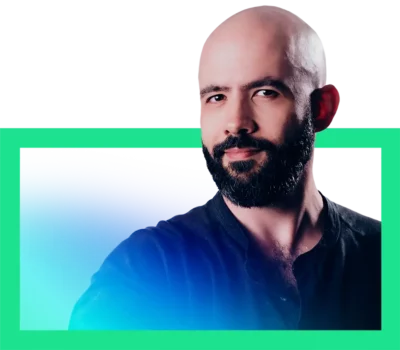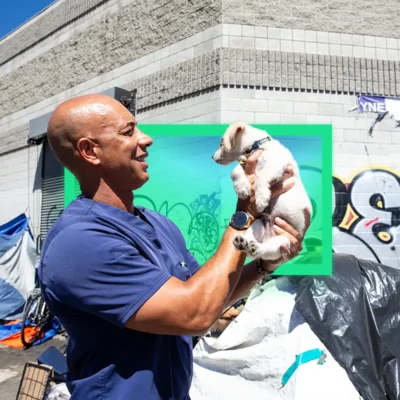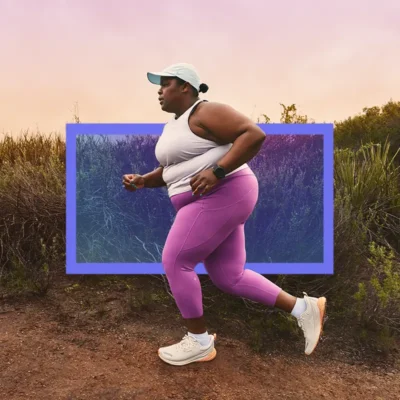Living into my true self
Years before his YouTube-phenomenon cooking show Binging with Babish, the filmmaker Andrew Rea finds himself slipping into despair. His day job is draining him; so is an unhappy marriage. He finds the courage to take big bold steps toward a new life that’s centered on his passion for food. But there’s a Part Two of this story. Because even as he finds a more fulfilled version of himself, he learns to temper some of his younger ideas about happiness.
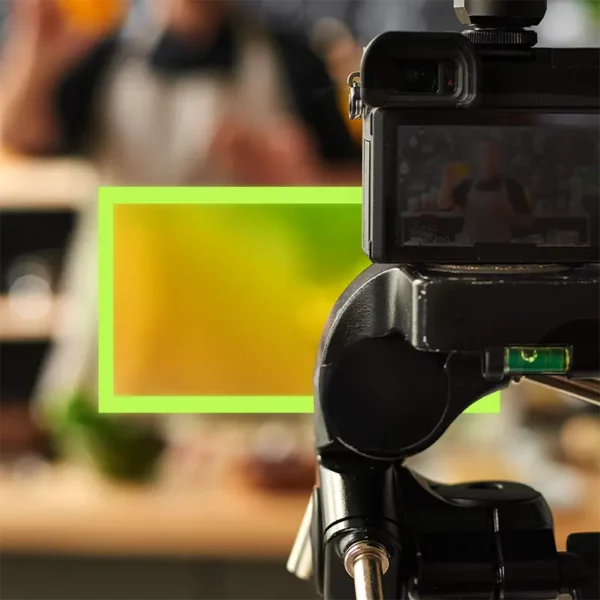
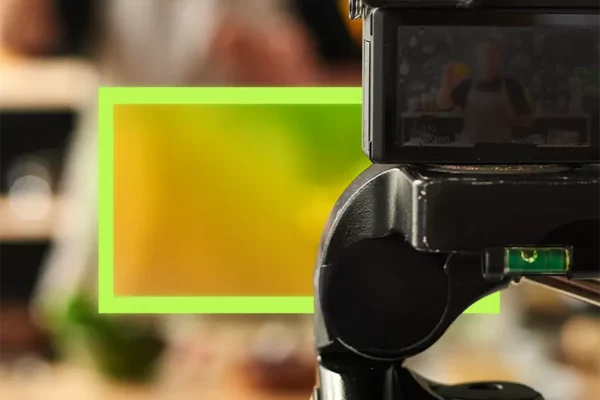
Transcript:
Living into my true self
ANDREW REA: I’m surrounded by blinking lights – headlights racing past in both directions on the bridge, office lights dotting skyscrapers and industrial buildings along the skylines on both sides of the river. The city is so expansive and energetic, it feels endless, but the energy doesn’t penetrate me. I can only see the walls closing in on my life.
ROHAN GUNATILLAKE: Having recently outed myself as a fan of food Youtube, I’m so excited to introduce Andrew Rea, whose cooking show, Binging with Babish, has been seen more than 2 billion times. In his show, he takes food ideas from pop culture and creates them in his kitchen: Kevin’s famous chili from The Office, the Krabby Patty from Spongebob Squarepants, the “poutine on the ritz” burger from Bob’s Burgers. But just a few years ago, the show didn’t exist and Andrew’s life looked very, very different.
We’re going to release Andrew’s Meditative Story in two parts. This is part one. It’s a bit of an experiment, so let us know what you think at [email protected]
Andrew shares what leads him to drastically alter the trajectory of his life in a matter of months, and how he builds his life back up after burning so much of it down. It’s a tough episode in some ways because what he learns emerges from letting go of a relationship, but it’s an important life event that many of us may experience.
In this series, we combine immersive first-person stories, breathtaking music, and mindfulness prompts so that we may see our lives reflected back to us in other people’s stories. And that can lead to improvements in our own inner lives.
From WaitWhat, this is Meditative Story. I’m Rohan, and I’ll be your guide.
The body relaxed. The body breathing. Your senses open. Your mind open. Meeting the world.
REA: I’m in bed. It’s 2 p.m., but the curtains are drawn, the lights off. I haven’t eaten in days. It’s a very small room, barely big enough for the bed.
I’m trying to sleep, or wake up, and I’m not able to do either. I’m in a sort of purgatory of consciousness. I’m lying on my side, underneath layers of comforters and sheets, staring at the wall. My fan is oscillating back and forth, back and forth, back and forth.
For the last 13 days, I’ve told my bosses that I have food poisoning. I have severe guilt about being dishonest, so I force myself to throw up with nobody around to see it so that when I get back into bed, I’m like, “Ugh, okay. I deserve this now.”
At the root of my fake illness? A short film.
I’m desperate to make a career out of filmmaking, and for the last year or so I’ve been working with a filmmaker on a feature documentary. I can’t go into too many details out of respect for those involved, but suffice it to say, this became a desperately toxic situation. Clashing egos and delusions of grandeur run rampant, every creative decision I made getting picked apart, started from scratch, or scrapped entirely. Maybe you’ve had a boss like this. He challenges every decision I make, and soon, his nagging doubt seeps into me. I begin to wonder whether I actually have anything of value to offer at all. I begin to believe he’s right.
On a separate project with the same director, a mounting deadline forces us into a five-day-long marathon, editing an entire film from scratch. I’m still working a full-time job, so sleep is forgone in favor of protracted editing sessions, all under the watchful eye of someone on the verge of breaking my spirit.
I edit our footage for those five straight days to get it ready to submit to the festival. And I mean, without stopping. The wire trash can under my desk is overflowing with takeout containers. I legit see the sun rise and set four days in a row, my only company the director, his unrelenting criticism, and my burgeoning nicotine habit. I can’t quite tell you how unnerving it is to build a narrative out of raw footage while the director sits over your shoulder. But I power through.
After we turn in the film, I pass out on my office couch.
I wake up an hour later to my phone ringing. It’s him. He knows somebody in the festival who gives him immediate feedback. Half-awake, I hear his voice coming through my phone say, “Hey, we got in, but we’re going to need to scrap this. We need to start over. We’ve got two weeks this time.”
I am up on one shoulder, half-sitting-up for the call, but when I hear those words, I collapse onto the couch. Starting over – again – after everything we’ve already been through is just too much.
I press my fingers into the bridge of my nose and squint my bloodshot eyes, and I say, “I can’t do that, man.”
He isn’t able to access any level of compassion.
He says, “You’re bailing on me? You’re quitting now? We are in, and you’re quitting on me?” He sees my pain and exhaustion as something I’m doing to him.
As he says those words, I feel something in my gut tighten and snap a little. I stare at the ceiling and speak very slowly, “Yeah, dude. That was one of the most horrible weeks of my life. And it feels completely hollow right now because you’re telling me the thing that got us in is scrapped.”
Picture somebody sinking into quicksand, and right after their face goes under, their arm still sticks out, desperate to grab hold of anything. Now imagine someone throws them a cinder block. That’s how I feel. I’m drowning, and my life line is snapped.
Now I sink fully. My arm goes under.
It feels like I’ve been in this bed ever since.
GUNATILLAKE: You can imagine the tightness Andrew may feel in his body. Do you have any tightness? Let’s breathe into the area in our body that feels tense and tight, sending the breath to restore. Take your time. Three full breaths. Picture the part of you that receives those breaths.
REA: I live in a tiny Queens apartment with my wife, who I’ve been with since I was 15 years old. We are both the only people who we’ve ever been with, high school sweethearts, all that jazz.
We attend different colleges – mine on Long Island, hers in Manhattan. Every weekend I skip all of the activities and social events on my own campus and travel to see her instead.
Despite never giving each other a reason to, we live in a constant suspicion of one another. That one of us might cheat, that one of us isn’t happy, that one of us doesn’t trust the other – because we don’t.
Neither of us have any reason to actually worry, but the result is that neither of us have a real, fulfilling college experience either.
After college, we start to grow into real people. The human brain doesn’t fully mature until about age 24, after all. I notice us changing. My interests don’t interest her, and hers don’t interest me. I’m getting tattoos and listening to different music. She’s climbing the corporate ladder and planning for a family. We don’t have friends, we have “my friends” and “her friends.”
But it’s okay – one of life’s inevitabilities. I watch a lot of sitcoms. My relationship isn’t any worse than what I see on King of Queens, or Everybody Loves Raymond. I accept the basic truth that marriage is about commitment above all else.
My two-week case of fake food poisoning eventually draws to a close. A couple weeks later, when the director invites me to a party to celebrate getting into the film festival, my wife wants to go more than anything.
I do not, and she thinks I’m being ridiculous for dreading it. “It’s going to be glamorous and a great opportunity to network,” she tells me. Everybody will get dressed up, and the drinks will be on the house.
I agree to go, on one condition: “When I say I need to go, I go. You can stay if you want, but I’m leaving when I need to go.” She reluctantly agrees.
We arrive at the party. It’s far and away the most prestigious industry event I’ve ever been to, and my self-confidence is at a near all-time low. My hair is thinning, I’m out of shape, and I wear baggy clothes to compensate. I’m doubting my appearance, my profession, my marriage, my ability, my personality, my very reason for existence as I’m sweatily shaking the hands of the people I admire. My wife is insisting that I network, a double Manhattan does nothing to remedy my drying mouth, and that’s when I see him.
Across the room I see the director. I shake his hand. I hear myself say a word I promised myself I wouldn’t say to him: “Congratulations.”
Instantly I’m desperate to retreat. I walk up to my wife and say, “I need to go home now.”
We’re both silent in the cab for the first five minutes. As we turn towards the Queensboro Bridge, she says, “I can’t believe you didn’t want to stay.”
Everything stirring inside of me suddenly, and so unexpectedly, rushes to the surface, all at once. I see my hand slam on the plastic divider of the cab, and I hear my voice, shredded from cigarettes, demand that the driver stop the cab. I get out, and I look back at her – she’s looking out the window, facing away from me.
Even if she were looking right at me, she wouldn’t see me. She still doesn’t connect with what’s happening to me. Or worse, she does, and perhaps cannot show it. To be fair, I really have no idea what she’s going through right now, either. It makes no sense to me, but I’m too caught up in my own pain to even wonder about hers. Maybe she feels the same way.
I shakily tell her that I’m walking home, and that I hope she gets home safely. I can not physically stop myself from slamming the door shut.
I walk back a little bit past a bunch of car lights, get up onto the sidewalk and walk onto the footbridge.
My heart’s racing – but outside, I can at least breathe, if only for a few moments.
I’m surrounded by blinking lights – headlights racing past in both directions on the bridge, office lights dotting skyscrapers and industrial buildings along the skylines on both sides of the river. The city is so expansive and energetic, it feels endless, but the energy doesn’t penetrate me. I can only see the walls closing in on my life.
GUNATILLAKE: In this moment of constriction, let’s do what we can to open out. A good way to do this is to soften the shoulders, raise the chin a tickle, and let the chest be expansive.
Opening the body and inviting the mind to follow its lead. When in the midst of mental turmoil, dropping into our body and doing what we can to encourage it to be more spacious, even if we don’t feel anything like that, can be just what we need to disentangle ourselves and avoid reacting from a place of tension.
REA: “Where do you feel your unhappiness?” my therapist asks.
“In my … chest, I guess. It’s a twisting, grinding, sour feeling. Like my chest is wincing.”
“As though you’re bracing for something?”
“Yeah. The way you feel muscles you never knew you had when you’re in a car accident.”
“Do you feel as though you’re bracing for something?”
“Well, I’m afraid of the future, so that’s one way to put it.”
“Why do you think you’re afraid of the future?”
“Well, because I’m screwed. I’ve hit a ceiling in my career, which is fast-evolving into software and outsourcing, I can’t afford my apartment, I don’t want to have and can’t afford the kids my wife is insisting that we start trying to conceive, our worldviews are diametrically opposed, and I am on an unstoppable collision-course with a life devoid of happiness or fulfillment.”
“And you feel powerless to change that?”
“Well yeah.”
“Why?”
This has been a dramatized, highly compressed account of about two years’ worth of therapy, finally uncovering an inescapable truth about my relationship with happiness: it would not be a possibility for me unless I left my marriage. It wouldn’t be possible for my wife either. I ask her for a divorce. It’s painful, expensive, and drawn out, but it’s also quiet and civil. I know with every fiber of my being that it’s the best decision for both of us.
My phone rings. It’s my friend from high school calling to tell me he’s found us a little railroad apartment in Harlem. I don’t even ask to see it. He assures me it’s great, and we move in together.
I love it for everything it is and everything it isn’t.
The place is a row house – an already quite thin building that has been, against all logic, divided down the middle lengthwise into two even thinner apartments, each a collection of very narrow rooms connected by a narrow hallway. To get to my bedroom, you have to walk through the living room and then down a long, unlit hallway past one roommate’s bedroom, past my other roommate’s bedroom, past the bathroom – all the way down to my room at the end.
The fire escape is off my bedroom. It overlooks the back alley behind this amazing restaurant that soaks our apartment in the smell of the most beautiful, wood-fired, Neapolitan style pizza all day, every day. The restaurant staff takes cigarette breaks in the alley – a dishwasher screams at someone on the phone. A server runs lines with the bartender. Those two are definitely sleeping together. It’s my little pizza shop menagerie.
Sitting on the floor with my roommate eating takeout, it dawns on me that I’ve missed out on just being me.
I open a beer and fetch another dumpling, and decide in this moment to live into my own integrity. To honor my true north. My truest sense of self. My center. Everything that happens to me until now is me, and everything that comes after is also me. I’m not two lives or two individuals. There is no before, nor an after. I am no longer part of a whole, I am one, and I can finally be or do anything I want. I decide: I’m going to paint the kitchen.
Rohan’s closing meditation
GUNATILLAKE: Let’s talk about editing. It is what Andrew has to do in that job with that awful boss. Cutting and presenting footage that tells the story that they want to tell. And because of how much footage there is, it’s a process filmmakers of course need to do.
But in our own lives, it can be helpful and sometimes even nourishing to be with the raw material. So let’s do that.
Eyes open, or eyes closed. No difference. Let’s take everything in. Aware of every single piece of sense data as it arises in our consciousness.
Not caring if it’s a sensation, a smell, a thought, a taste, a sound, or a visual impression. Or a mood even.
Allowing everything in.
The raw material of life. No need to name. No need to edit. No need for stories. Just knowing it as it appears.
But noticing when names and stories and the urge to edit arise. And seeing if you can tell the difference between that and the raw material.
There is a difference. Can you feel that difference?
Everything that is happening is happening. As Andrew says, “There is no before, nor an after.” Just this. And maybe gratitude for this.
This completes Part 1 of our Meditative Story with Andrew Rea. I hope you will join me next time as we continue his story in Part 2.
Thank you Andrew, and thank you.
Part 2: Story
GUNATILLAKE: Hello listeners. Welcome to part 2 of Andrew Rea’s Meditative Story. Here are a few highlights from last time:
REA: I legit see the sun rise and set four days in a row, my only company the director, his unrelenting criticism, and my burgeoning nicotine habit. I can’t quite tell you how unnerving it is to build a narrative out of raw footage while the director sits over your shoulder.
I see the director. I shake his hand. I hear myself say a word I promised myself I wouldn’t say to him: “Congratulations.”
Picture somebody sinking into quicksand, and right after their face goes under, their arm still sticks out, desperate to grab hold of anything. Now imagine someone throws them a cinder block. That’s how I feel
I live in a tiny Queens apartment with my wife, who I’ve been with since I was 15 years old. I watch a lot of sitcoms, my relationship isn’t any worse than what I see on King of Queens, or Everybody Loves Raymond.
I ask her for a divorce. I know with every fiber of my being that it’s the best decision for both of us.
Sitting on the floor with my roommate eating takeout, it dawns on me that I’ve missed out on just being me.
I decide: I’m going to paint the kitchen.
GUNATILLAKE: Now, let’s pick up our story with Andrew Rea as his journey continues.
Andrew is a Youtube phenomenon whose cooking show, Binging with Babish, has been seen more than 2 billion times. In his show, he takes food ideas from pop culture and then actually creates them in his kitchen – and his fans (which I include myself in) eat it up.
In today’s Meditative Story, the second in a two-parter, Andrew shares how he builds his life back up after burning so much of it down – and what he learns along the way.
In this series, we combine immersive first-person stories, breathtaking music, and mindfulness prompts so that we may see our lives reflected back to us in other people’s stories. And that can lead to improvements in our own inner lives.
From WaitWhat, this is Meditative Story. I’m Rohan, and I’ll be your guide.
The body relaxed. The body breathing. Your senses open. Your mind open. Meeting the world.
REA: Sitting on the floor eating Thai food, I look up at the walls of my living room and kitchen. They’re too white. So I decide to paint them off-gray.
If someone else had asked me to spend a day painting walls, I would have felt imposed upon. But here I am, of my own volition, going out and buying rollers and tarps and the cheapest paint I can find and carrying them back from East Harlem to West Harlem in the sweltering heat.
I clumsily tape off the edges and ceilings, shake out the slippery tarp, and pop the cans, perfuming the air with their unmistakable smell. It’s 95 degrees in the dead of summer, and we have no air conditioning, so I paint in my underwear. All day long. I’m sweating buckets. And I’m having the time of my life.
I’m barely changing the color of the walls; it is the tiniest, littlest, aesthetic decision. But it’s mine. I own it.
The rush of acting in my truth – even in this household chore – is completely new to me. I’m expressing myself creatively for the first time in many years. I’m making my own decisions, my own mistakes, and I’m finding my own path.
A few months later, I’m sitting in a different kitchen – the eat-in kitchen of a cozy, one-bedroom house in Nebraska across the table from a woman I’m now dating. I feel in love again – that not-thinking-entirely-clearly kind of love, and I give myself permission to feel it. It simply “is.” I’ve already extended the trip twice to feel my way into this new experience, but I have to leave tomorrow.
We first meet online. Her Facebook profile picture shows her dressed as Furiosa from Fury Road. I had dressed as Mad Max that same Halloween. Fourteen-hundred miles can’t stop what we quickly discovered was amour fou, love on fire, the uncontrollable, unstoppable, unexplainable kind of love. It’s intoxicating.
Tonight, we’re both feeling low energy, because this wonderful thing that we’re feeling will be tested when my plane takes off.
To be in the moment with her. Here. Now. With full awareness and attention, I make the most delicious pasta dish. It’s called pasta alla norcina, a kind of obscure dish that I love to death. It is a pasta in a cream sauce with pork sausage that’s seasoned with fresh rosemary and nutmeg. It’s rich, full, complicated. We savor this meal together.
And then it occurs to me: I’ve always wanted to shave my head. I’m losing my hair, and I’m self-conscious about it, and my ex wouldn’t have allowed it in the past. It’s my final act of rebellion.
I share the vulnerability I feel in going bald, and she doesn’t say anything. She pushes back from the table, gets up, and runs into the other room. A moment later she returns, holding a pair of clippers. We walk into the backyard. It’s almost sunset. Birds are out, and they just happen to be singing. Such fortuitous timing, or is it that I’m just noticing for the first time what’s always there? She’s an avid birdwatcher, so she’s naming them one after another: American Robin, Downy Woodpecker, Song Sparrow, White-Breasted Nuthatch. Flickers are her favorite, and her excitement is palpable when she spots one.
I sit down on the top of her picnic table and hear the clippers click and begin buzzing behind me. Before I know it, my spindly, product-stiffened hair is falling down around my shoulders. She’s laughing. I’m laughing. Honestly, it’s so ridiculous for us to be here, to feel like this, to be doing this. I feel the crisp twilight air against my newly bare scalp, and I’m taken aback by the possibility of it all. So simple. We’re both just going with it. We are open. We are curious.
GUNATILLAKE: These are good words. Simple. Open. Curious. Let’s express them now. Our attention with the story. Ready for whatever comes next. Simple. Open. Curious.
REA: The next leg of this new journey is a little more complicated – call it a measured and premeditated form of rebellion.
I’ve been working 50 or so hours a week on my Youtube show and then another 50 a week at my day job, and I’ve just started earning more from my show than I do from my job.
My “day job” is at a tiny, four-person visual effects company. The husband and wife founders hire me with zero experience and stick with me through my struggles. They’re at my wedding. They’re there for me through my divorce. They’re great people. I’m sometimes overwhelmed with gratitude for them. I adore them.
I invite them into my office. My stomach is in knots.
They enter. My office is so small that it can’t fit more than three people in here at a time, and it looks out on a church that burned down two months ago. Quite the dramatic backdrop for this moment.
My boss Diana sits on the client couch, while my other boss John stands near the door. I’m shaking, I’m so scared of what I’m about to say.
I have to quit, I announce.
I start to cry immediately. This job has been my anchor ever since I moved to the city. I manage to compose myself enough to say all the things I rehearsed: That I would be crazy not to pursue this opportunity. That I’ll give them 75 days notice. That I’ll stay on as long as they need me to train a replacement. That I’ll forever be grateful to them.
I film my show in my tiny Harlem kitchen. That’s why I abruptly decide to paint the walls on that sweltering day – off-gray works better on camera. I also have to set things up at a weird angle. I have to put the camera in front of the fridge to get the shot, but that means I can’t get anything out of the fridge while I’m filming. Not ideal for a cooking show.
I shoot and edit everything myself. I ruin several episodes because I’m out of focus, or because the memory card fills up but I don’t notice. I’m literally setting up the camera on one side of the kitchen, pressing record, and then running back around the table, like I would’ve in high school.
I went to film school for four years, and in a way, I’m back to making home movies.
But slowly, over time, I get into a rhythm. I work out the kinks. I get better equipment and start collaborating with a partner and later a small team.
Over the years, I become quite successful. Which makes it strange when I find myself missing the early days, when I let go of what wasn’t working in my life and started so many things anew. I had nothing, but in that nothingness, there is potential for everything.
I like to think that I work for myself. But nobody really works for themselves. I can’t remember a day that I’ve done whatever I want. After all, I’m my own boss. I can take the day off whenever I feel like it, right?
As a content creator, we can find ourselves trapped by an algorithm that has an insatiable appetite. If I don’t put out enough episodes, it hurts my channel. And in spite of the therapy, the pills, the cataclysmic life changes, I’m incapable of distinguishing my channel’s problems from my own. My ego and sense of self have become irrevocably tied to it, and when anything doesn’t perform or is disliked, I cannot help but take it personally.
I’ve built something substantial that I’m proud of and that’s truly my own — but every bit of pride and satisfaction I feel is coupled with a sense of obligation. A hovering presence over my shoulder, curiously excited to pick apart anything I do, quick to point out when I’ve made mistakes and addicted to the drama of that discovery. If you listen to part one, that might sound familiar to you.
GUNATILLAKE: As Andrew does here, bring to mind one of your own greatest achievements, the first that comes to mind. And notice if like Andrew, any commentary or inner criticism comes with it?=. Interesting isn’t it?
REA: Like anyone, I still have good days and bad days. And I can tell today is going to be a bad day.
It’s 7:30 a.m., and my alarm is screaming at me. I only have two hours until a sponsored episode is supposed to go live on my channel, and I know it’s going to be late because I’m still in bed. I had promised myself I’d be downstairs by 7.
I’m not a morning person. I’m staring at the ceiling, and my fiancée is cuddling me and making it very hard to get up. She is nothing short of an extraordinary cuddler, and on a winter morning like this one, leaving her side doesn’t just feel illogical, it feels ill-advised.
I throw on some PJs, make coffee as quickly as I can, and hobble downstairs to my studio. I turn on some soft ambient lighting, because I’m not fully awake, and nurse my coffee.
I’ve already filmed the episode, and now I need to record nine minutes of voiceover, which will take about three hours. I recorded one single sentence last night before giving up and deciding it’d be easier to do it in the morning. Now that it’s morning, I think, “Man, why didn’t I just do it all last night?” The single line recorded still hangs lazily in the timeline, taunting me.
I don’t even like this episode. It’s not a dish I wanted to make, and I’m not satisfied with my iteration of it. It’s sponsored, so it’s had its teeth filed down for fear of upsetting the brand. It’s frenzied and disjointed. I know my audience will be able to tell that my heart isn’t in it. I dread reading comments that haven’t yet been written on a video that isn’t even done. That needs to be done. I don’t have a choice. Feed the algorithm.
I stammer my way through the voice-over, half a line at a time, sighing loudly, and slamming my hand on the desk every time I flub a word and need to start over. It’s unentertaining, uninspired, very procedural. And because my heart isn’t in it, I make mistake after mistake. I export the episode in mono, so if you’re listening on headphones, you can only hear me in one ear. I list an ingredient incorrectly, and forget to fade out the music at the end.
Despite my best efforts, I publish the episode several hours late. Fewer people than usual watch it. Those who do leave comments about how their left ear liked the episode much more than their right ear did.
It’s good-natured ribbing, and I smile when I read it, but I feel incompotent. The next day, a spirited thread emerges on Reddit, positing the question: “Is Andrew having fun anymore?” It’s difficult to explain what it’s like to read dozens of theories, written with care and curiosity, speculating on everything from your professional integrity to your mental health. It’s as halting as it is holistic.
A week later, I’m having a very good day.
I’m working on an episode about dalgona, the Korean honeycomb candy from the Netflix smash hit Squid Game. On Sunday, I spend the day reading and listening to music and writing – call it creative self-care.
Now it’s Monday, and the episode needs to be done tomorrow. I’ve already tried to make dalgona several times.
It’s very, very challenging for a newcomer. You have to heat sugar to a specific temperature and specific color. You add just the right amount of baking soda to make it foam up and become light and frothy – that’s what turns it into a honeycomb candy instead of rock-solid sugar.
Once it foams up, you pour it out onto a nonstick heat-proof surface and press it into a very thin wafer. Then you press a cutout into it – an umbrella or star or triangle. A few degrees too hot or cold, the dalgona can stick to the press, or break.
I fail, and I fail, and I fail, and I fail. But it’s a fun type of problem to work on. After 17 tries, everything starts to fall into place. The press releases from the lava-hot sugar cleanly, leaving a near-perfect disc on the greasy mirror plate. The umbrella leaves a delicate imprint, and once cooled completely, the candy releases free from cracks with a satisfying little “tink.”
It’s time to start editing, so I rip out the memory cards and run to my computer. I feel like I’m in college again. I put a whole gag into the edit that is totally stupid and silly and takes hours to get it just right, but it’s so much fun.
I don’t even realize time is passing. Before I know it, it’s midnight. I’ve entered a flow state, something I haven’t done in ages.
Normally, I have a great deal of trouble falling asleep – all the thoughts I didn’t have time to think during the day come screeching like cicadas. But tonight I can feel my grip loosening. I don’t know what I’m filming tomorrow. I don’t know what next week’s episode will be. I don’t know when I’ll stop the show. I don’t know what I’ll do after it’s gone. For the longest time, I railed against anything and anyone that threatened my sense of self – romantically, professionally, personally. The last person I expected to stand in my way was myself. I’m drifting off to sleep, but before I surrender, I can’t help but think that the walls could really use a fresh coat of paint.
Part 2: Rohan’s closing meditation
GUNATILLAKE: If Andrew is a superhero of modern media (which as someone coming up to 10 million subscribers on Youtube, he basically is), then there is a moment here which is his origin story, the moment he gets bit by a radioactive spider. And it’s the mundanity of painting his kitchen from white to off-gray.
It’s special though. Remember the words Andrew uses: It’s acting in his truth. “I’m expressing myself creatively for the first time in many years. I’m making my own decisions, my own mistakes, and I’m finding my own path.”
That moment and the act of painting itself becomes a lever, a glimpse of another way of being that Andrew goes onto fully inhabit.
So as we go into our short closing meditation together, I’m here wondering what I can do to make that space for you.
You might be someone who’s been with us from the beginning, explored this adventure for a hundred shows, trying several rainbows worth of mindfulness techniques and ideas. Good to see you again.
Or this might be your first episode, you’re very welcome.
It doesn’t matter where you sit on the 1-100 scale. Let’s do something together that is about making your own decision, your own mistakes, about your own path.
And what it is is that I’m going to trust you to do a meditation or mindfulness technique, based on what you know already, and based on what you feel you most need in this moment.
So for the next three minutes, I’m inviting you to back yourself because I do. And do what you need to do.
If you’re new to meditation, you could just rest your attention with your breathing. Or just reflect on what struck you most from Andrew’s story.
Ok. I’ll see you in 3 minutes.
One minute in, just resetting the intention to spend this time how you want to. Reflecting or resting with the breath if you’re not sure what to do.
One minute to go. Taking your own path in this meditation, trusting yourself that you know what you need.
Hi there, that probably seemed longer than three minutes, but hey, time is a weird one. That might have been quite challenging or it might have been straightforward.
So much of modern meditation has people like me, a guide or teacher, taking you through an exercise or practice, so today I wanted to play with an idea that you can be your own guide, and encourage your own natural wisdom to express yourself in a way that feels natural to you. So please forgive me if it was a bit tricky. But minds can be like that sometimes.
Our time with Andrew is now up, and so as you move into the rest of your day, there’s a reflection I want to leave you with. To move into a space where he could start forging a path that felt very much his own, Andrew had to let go of some things so he could pick up others. There is only so much we can hold, so Andrew’s story has me thinking about whether what I’m holding best serves me.
Thank you Andrew. And thank you.

